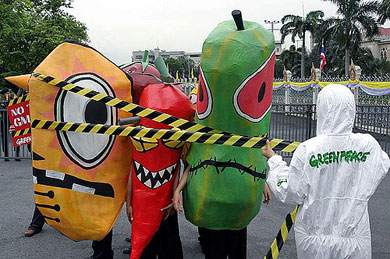America isn’t perfect and emulating the European Union isn’t exactly a good way to bring back some of the glory from the pre 9/11 era.
However, we should definitely pay attention to the way the EU deals with GMOs in their food supply.
That’s because on September 6 the EU’s top court paved the way for farmers and beekeepers to recover losses when their crops or honey become genetically contaminated from nearby GM fields.
The European Court of Justice also ruled that all food products with GMOs must undergo an approval process, even if they are not intentionally designed to be GMOs.
This was all made possible by the persistence of Bavarian beekeeper Karl Heinz Bablok. He joined together with many others by suing the EU when their research plots of Monsanto’s GM corn, MON 810, tainted his honey.

At first they (courts) tried to tell him that he couldn’t sell or give away his contaminated honey. They also told him that he has no means of legal protection against the GM crops. He and his group then decided to quickly file a new lawsuit.
Attorneys for the beekeepers have said that they might have “a claim for damages against a farmer if MON 810 pollen from his cultivation gets into their honey.”
What this means is that not only is the EU more wary of GMOs (rightfully so) than the US, but they are also more accepting of the idea that Big Arga/Biotech companies are doing damage to the food supply and they should be held accountable.
In Europe they see the potential dangers of unleashing controversial biotechnology into their food supply and therefore take pains to limit its applications. In America the biotech giants get to do whatever they want because the U.S. lags so far behind the rest of the world in science education that we cannot begin to understand why GMOs are a Pandora’s Box.
I’m not a big fan of government intervention in the in the economy, but I feel that we should be more like the EU when it comes to GMOs. Experts really have no clue what GMOs will do to people who consume them, so isn’t that a reason to be more cautious when dealing with their place in our food networks?
We also didn’t know what Agent Orange would do to be people when we used it in Vietnam. Of course some “lunatic fringe” scientists tried to raise concerns about what Agent Orange would do, but they were pushed aside like they always are here in the U.S. You can thank our militarized nation building policies for that.
Clearly, the concerns of the war state outweigh the voices of skeptic scientists.
Of course, it’s not like Europe is a totally GMO free zone, either. Their scientists and experts are still battling with politicians over where GMOs should be in their food supply. But right now their citizens’ concerns over GMOs are represented in government.
Compared to the US, the EU has very little GMOs in their food supply. They also don’t view biotech firms as untouchables because of the money they have.
The U.S. should be more like the EU when it comes to GMOs because you can’t claim to be the freest nation in the world when other countries aren’t having GMO foods forced into their food supply.
All it would take to fix the problem with GMOs in the U.S. is a label attached to packages of GMO foods. Unfortunately, we don’t have anything like that in the States – yet.






